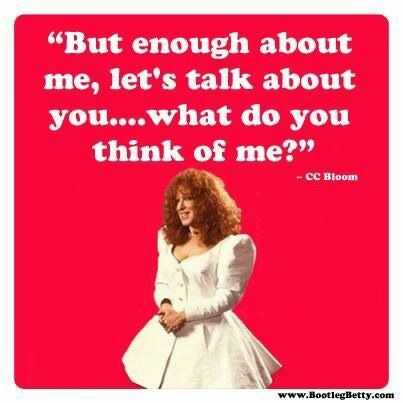The freedom of realising that no one's thinking about you
Why we should embrace our cameo status in other people's lives.
An audio version of this article is available here:
There is a quote from Infinite Jest by David Foster Wallace (a book I haven’t actually read, FYI), that I think about a fair amount:
“You will become way less concerned with what other people think of you when you realise how seldom they do.”
On the face of it, this may seem a smidge harsh. What do you mean no one’s thinking about me? I AM EXCELLENT. PEOPLE SHOULD BE THINKING ABOUT HOW EXCELLENT I AM ALL THE TIME. But those aren’t the kind of thoughts it’s referring to. We’re rarely concerned with how wonderful everyone thinks we are – rather how awful they think we are.
We worry they think we’re crap at our jobs, unfunny, unattractive, too much, rude, obnoxious, or just plain annoying. This quote reassures us that they’re not thinking that at all – they’re too busy thinking about themselves.
We are only the main characters in our own lives, no one else’s. And accepting that is a blessed relief.
It’s not about you, pal. Or me.
That person moved seats on the train because you smell. Your colleague didn’t wave back because he hates you. You didn’t get that job because you’re a massive chancer. Your date ghosted you because you’re ugly.
We all have our own emotions and filters. It’s why we make such godawful witnesses – we interpret events according to our own experiences, biases and how we felt at the time. If 10 people witness a bank robbery, you’ll get 10 different stories about what happened. We form our own narratives and then act as if they’re factual when they’re not.
Thoughts aren’t facts. They’re hypotheses formed by our biased brains.
We expect people to dislike what we dislike about ourselves. To notice what we believe are our flaws. If you think you’re not pulling your weight at work and someone mentions that a job hasn’t been finished – you’ll take it personally even if it wasn’t your job to finish it in the first place. If your friend suddenly goes quiet on you, your immediate thought might be, “What have I done wrong?” rather than “I wonder if they’re OK” because it taps into a core fear about being forgotten or ignored.
And, because our thoughts impact our mood, body and behaviour, we then respond in habitual ways – by looking for other ‘evidence’ to prove the fear, getting defensive, retreating into ourselves, or seeking reassurance.
But guess what? THEY WEREN’T THINKING ABOUT YOU AT ALL. YOU HADN’T EVEN CROSSED THEIR MIND. The person moved seats because the sun was in their eyes. Your colleague wasn’t wearing his glasses and so didn’t spot you waving. You didn’t get the job because the boss gave it to their wastrel nephew whose only talent is grunting at gifs. And your date ghosted you because they’re actually married.
No one cares!
Nearly 2,000-odd years ago, Marcus Aurelius (yep, him from Gladiator) observed, “We all love ourselves more than other people, but care more about their opinion than our own.”
We are social animals. We need and crave social acceptance. Back in our cave-dwelling days, rejection from our clan or tribe meant certain death. This instinct still exists and hasn’t caught up to modern-day life, meaning we now fear being ‘cancelled’ or being thought shit as much as we used to fear being fed to the lions. The fear of shame plays a huge role in this too, leading us to overvalue other people’s opinions.
Social media has exacerbated these traits tenfold, obviously – both our belief that we’re the main characters and our terror of being judged and found wanting. We’re the stars of our own content, constantly thinking of ways to promote our looks, thoughts, cats and kids, and thriving on external validation. If we don’t get it, it’s unsurprising that our thoughts may turn to self-chastisement and a feeling of shame.
In 2021, #NotTheMainCharacter trended on TikTok in response to Covid turning everyone’s thoughts even more inwards than usual. There are fascinating studies on how our brains default to ‘self-referential processing’ in certain situations anyway, let alone when a global pandemic removes the daily touchpoints with others that keep us grounded.
Studies have been conducted on whether we’re all becoming more narcissistic, but this is complicated by the overuse of the word and whether the ‘proper’ psychological definition can account for the societal changes we’ve seen since the birth of the internet. Either way, worrying about what people think of you is not narcissism, it’s being human.
But remember: we constantly overestimate how much people think about us and our failings. In reality, no one cares!
We should embrace our cameo status
Acknowledging that we’re all supporting players in other people’s lives is liberating. We’re Stan Lee in a Marvel movie or Jennifer Coolidge in Friends. We appear, move the plot along and then disappear again.
Of course, sometimes people actually are critical about or angry with us, but most of the time they’re just thinking about themselves – exactly like you are. Next time you’re centring yourself in a situation, ask, “Am I making myself the main character? How likely is it that this is actually about me? Are there any possible alternative explanations? Isn’t it more likely that this is entirely about them? Isn’t it more likely that they don’t give a tiny infinitesimal shit about what I’m worrying about?”
It can be helpful to think about it in terms of a court case: Is there a reasonable doubt that you committed this ‘crime’? Yes? In which case, throw the case out! You’re innocent! Pass “Go”, collect £200 and enjoy your life.
If there is no alternative – if you’re 100% sure that whatever this is it’s about you – then you can either do something about it or write it off. Confront the issue, apologise, or embrace the embarrassment and move on. Otherwise it’s just going to chew you up.
Just One More Thing…
Realising people seldom think about us means we can take things less personally, feel less judged, brush criticisms off more easily (because they’re not symptomatic of a wider picture), and focus more on stuff that actually matters. Like, how Arsenal have cocked up the season, that the Barbie movie is out this summer (hurray!), and what the hell kind of coat you’re meant to wear in this half-arsed weather.
This is a good article if you’d like to read further. Also, I have written a bunch of mental-health books that cover subjects like this – feel free to buy one, by all means! If you enjoyed this post, I’d love a subscribe and a share. It massively helps. Thanks so much. Until next time.









AHHHHHH Jo, this is SO GOOD. I love your writing so much. I'm going to be reading this once a month. At least. X
LOL. Just what I needed to read this morning!